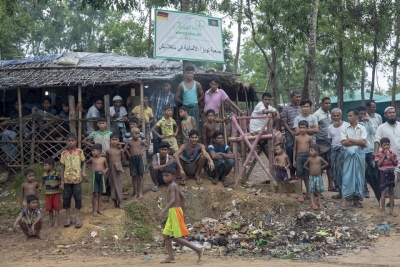Xenophobia against Rohingya grows in Malaysia amid pandemic
By IANS | Published: May 1, 2020 10:55 AM2020-05-01T10:55:01+5:302020-05-01T11:10:07+5:30
The ongoing COVID-19 pandemic has increased xenophobia against the Rohingya living in Malaysia as the government pushes back boats with hundreds of members of the Muslim minority trying to reach the country's shores, a media report said on Friday.Around 100,000 Rohingya refugees live in Malaysia, said the Efe news report.In the Muslim-majority Malaysia, the Rohingya have found a safe haven, compared to their home country, and can find work in sectors such as construction, but their position is extremely precarious as most are not officially recognized as refugees and have to live as illegal immigrants in a society that often views them with suspicion, the Efe news report said.

Xenophobia against Rohingya grows in Malaysia amid pandemic
The ongoing COVID-19 pandemic has increased xenophobia against the Rohingya living in Malaysia as the government pushes back boats with hundreds of members of the Muslim minority trying to reach the country's shores, a media report said on Friday.
Around 100,000 Rohingya refugees live in Malaysia, said the Efe news report.
Last week, at least 350,000 people signed various campaigns on Change.org, which were later deleted, calling on the Malaysian government to expel all Rohingya from the country.
"The campaign is highly orchestrated with an onslaught of materials being generated to deliberately stir up reactions, anger, hatred and xenophobia," Lilianne Fan, director of the NGO Yayasan Geutanyoe (Geutanyoe Foundation), which is dedicated to working with refugees, told EFE.
"The campaign has generated a lot of fake news that plays on very sensitive issues, including that Rohingya demand Malaysian citizenship, that Rohingya come to marry Malaysian women... that Rohingya are potential terrorists.
"These are not issues that are arising spontaneously, they are being generated by a hate campaign," she added.
Fan believes that one of the factors in the uptick in xenophobia against the Rohingya was "insecurity about COVID-19", of which 6,002 cases have been detected in Malaysia and 102 people have died, causing the closure of borders and strong containment measures which have also caused the majority of Rohingya to lose their jobs.
Malaysia has for years been one of the preferred destinations for Rohingya fleeing the oppression they suffer in their country of origin, Myanmar.
In the Muslim-majority Malaysia, the Rohingya have found a safe haven, compared to their home country, and can find work in sectors such as construction, but their position is extremely precarious as most are not officially recognized as refugees and have to live as illegal immigrants in a society that often views them with suspicion, the Efe news report said.
The recent hate campaigns against refugees began after the Malaysian Navy on April 16 intercepted a boat with about 200 Rohingya approaching its coast and, claiming that "undocumented immigrants" could bring COVID-19, they pushed it back out to sea where it is still stranded.
That same day, another boat arrived in Bangladesh with 396 severely malnourished Rohingya after two months at sea, during which around 100 people may have died, according to Doctors Without Borders.
According to UN figures, between 2012 and May 2015, some 170,000 Rohingya from Rakhine state put themselves in the hands of human smuggling networks to flee to Malaysia or Thailand, but the authorities of those countries managed to dismantle these networks in mid-2015, so the use of these routes was reduced to a minimum.
At the time, it was estimated that a little more than 1 million Rohingya lived in Rakhine, but in August 2017, the Myanmar Army launched a violent military campaign against them after Arakan Rohingya Salvation Army insurgents attacked police and military posts.
The military operation, for which Myanmar has to defend itself against accusations of genocide before the International Court of Justice in The Hague, caused the exodus of some 725,000 Rohingya to neighbouring Bangladesh. There they continue to live in the world's largest refugee camp complex.
( With inputs from IANS )
Open in app